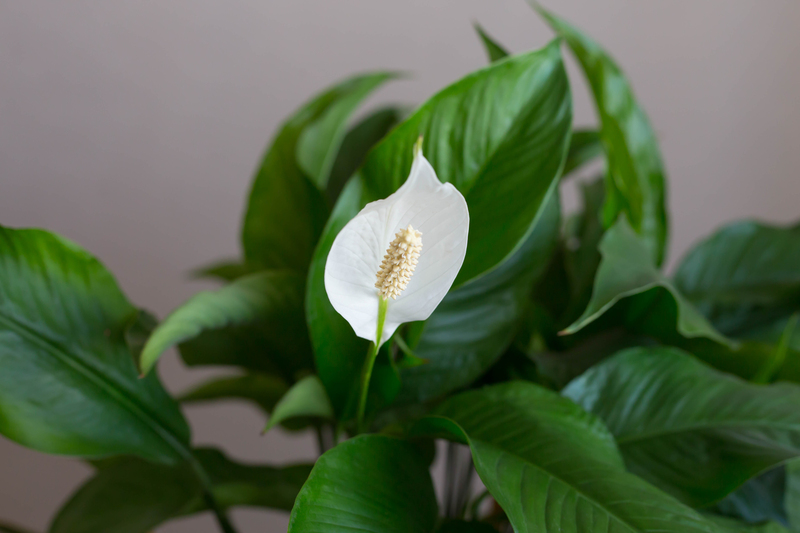Simple Tips for a Lush and Healthy Herb Garden
Posted on 24/05/2025
Simple Tips for a Lush and Healthy Herb Garden
Growing your own herb garden can be a delightful and rewarding experience. Whether you have a tiny apartment balcony or a spacious backyard, herbs are some of the easiest and most versatile plants to cultivate. With a little effort, you can enjoy a thriving, aromatic, and bountiful herb garden that will provide fresh flavors for your kitchen and enhance the visual appeal of your space. This article presents simple, practical tips to help you maintain a lush and healthy herb garden, ideal for both beginners and seasoned gardeners alike.

Why Grow Your Own Herbs?
Growing herbs at home offers numerous benefits:
- Fresh, organic flavors at your fingertips
- Save money on grocery purchases
- Reduce food waste
- Enjoy a chemical-free option
- Enhance your garden's biodiversity
- Therapeutic and stress-relieving activities
Cultivating a home herb garden brings enormous advantages. Not only do you get access to an endless supply of your favorite herbs, but you also benefit from the joy and relaxation that gardening offers.
Choose the Right Location for Your Herb Garden
Your herb garden's location is crucial for its success. Most culinary herbs such as basil, thyme, rosemary, and oregano thrive best in areas with plentiful sunlight. Here are a few key factors to keep in mind when selecting a spot:
- Sunshine: Most herbs require at least 6 hours of direct sunlight per day.
- Drainage: Ensure that soil drains well to prevent root rot.
- Convenience: Locate your herb patch near your kitchen or main living space for easy harvesting.
- Protection: Shield delicate herbs from strong winds and heavy rains.
Tip: If you lack outdoor space, grow herbs on a well-lit windowsill or under grow lights indoors!
Pick the Right Herbs for Your Garden
Not all herbs are created equal--some thrive in cooler climates while others demand warm, sunny conditions. For a lush and healthy herb garden, choose herbs compatible with your local environment and consider your culinary needs.
Popular Herbs for Beginners
- Basil: Ideal for summer, loves sun, and frequently used in Italian dishes.
- Mint: Hardy, fast-growing, but best kept in containers to prevent spreading.
- Thyme: Drought-tolerant and perfect for borders or container gardens.
- Parsley: Biennial, tolerant of partial shade, and rich in nutrients.
- Rosemary: Prefers dry, sunny conditions and adds fragrance to your garden.
- Chives: Easy to grow and attractive when in bloom.
- Cilantro: Grows quickly, ideal for spring and fall sowing.
Choose a mix of annuals and perennials to ensure you have fresh herbs year-round. Research local varieties and consult nearby garden centers for region-specific advice.
Prepare Your Soil for Success
Soil quality is the foundation of a healthy herb garden. Most herbs prefer slightly sandy, well-draining soil enriched with organic matter. Here's how to optimize your soil conditions:
- Test your soil: Simple DIY kits are available or send a sample to your local extension office.
- Add organic compost to boost nutrients and encourage robust root growth.
- Avoid heavy clay, which retains too much water and stunts herb growth.
- Mix in some sand or perlite for better aeration if your soil is too dense.
- Mulch around your herbs to retain moisture but avoid piling mulch against the stems.
Planting Your Herbs: Seeds vs. Seedlings
Deciding whether to plant seeds or purchase seedlings depends on your budget, patience, and gardening experience:
- Seeds: Cost-effective, more variety, and rewarding, but require more attention and take longer.
- Seedlings (Starter plants): Easier for beginners and ensures a faster harvest.
Tip: Start with seedlings for more challenging herbs (like rosemary or thyme) and seeds for fast-growers (like basil and cilantro).
Watering: The Key to Vigorous Herbs
Consistent and careful watering ensures your herb garden remains lush and green. Unlike some ornamental plants, herbs generally prefer consistent moisture without being waterlogged. Here's how to perfect your watering routine:
- Water early in the morning to minimize evaporation and prevent mildew.
- Check soil moisture by sticking your finger about an inch below the surface. Water if it feels dry.
- Avoid getting the leaves wet to reduce the risk of disease.
- Container gardens may require more frequent watering due to faster drying.
- Reduce watering frequency as temperatures cool in fall and winter.
Fertilize Sparingly for Strong Growth
Herbs do not need heavy feeding. Over-fertilizing can result in less flavorful leaves and weak plants. For a thriving herb garden:
- Use a balanced, organic fertilizer once a month during the growing season.
- Compost tea or diluted fish emulsion are gentle, natural choices.
- Stop fertilizing in fall to let herbs go dormant.
Avoid synthetic fertilizers, especially high-nitrogen types which encourage lush foliage but diminish essential oils and flavor.
Pruning and Harvesting: The Secret to a Bushy Herb Garden
Regular harvesting and pruning are essential to maintain lush, bushy herbs and increase yields. Here's how to do it right:
- Pinch back tips: Use clean scissors to snip just above a leaf pair to encourage branching.
- Don't harvest more than one-third of the plant at a time to avoid stress.
- Remove flower buds as they appear (especially on basil and mint), since flowering signals the end of leaf production.
- Continually harvest herbs you use frequently--this keeps plants producing new, tender growth.
Pest and Disease Management
While herbs are relatively pest-resistant, common problems include aphids, spider mites, and fungal diseases. Keep your herb garden healthy with these tips:
- Encourage beneficial insects (like ladybugs) to control pests naturally.
- Inspect plants regularly for signs of disease or insect damage.
- Use insecticidal soap or neem oil if infestations occur, but avoid spraying near harvest time.
- Avoid overhead watering and space plants properly to improve air circulation.
Rotate your herbs each year to prevent soil-borne diseases, especially in containers.
Container Gardening Tips for Herbs
If space is limited, herbs grow beautifully in containers. Follow these guidelines to maximize growth in small spaces:
- Select pots with plenty of drainage holes to prevent root rot.
- Use a high-quality, peat-free potting mix.
- Group herbs by water needs; don't mix drought-lovers (rosemary) with moisture-lovers (mint).
- Rotate containers every week for even sun exposure.
- Feed container plants more often as nutrients leach faster from pots.
Seasonal Care and Overwintering
Keeping your herb garden flourishing year-round requires some extra attention during the cooler months:
- Annual herbs (basil, cilantro) are best replanted each spring.
- Perennial herbs (thyme, sage, rosemary) can be mulched or brought indoors over winter in cold climates.
- Trim and tidy up dead foliage before the first frost.
- Reduce watering and stop fertilizing as plants slow down.
- Use grow lights to keep tender herbs alive indoors during winter.
Planning ahead ensures your herb patch thrives, season after season.
Common Mistakes to Avoid in Home Herb Gardening
- Overwatering: Leading cause of root rot and plant failure.
- Planting incompatible herbs together (different sunlight or watering needs).
- Neglecting to harvest regularly, resulting in tough or leggy plants.
- Ignoring pests and disease symptoms until it's too late.
- Over-fertilizing, especially with chemicals.
Awareness of these common pitfalls will help you grow a more vibrant and productive herb garden.

Creative Ideas to Enhance Your Herb Garden
Take your herb garden to the next level with creative twists:
- Create a vertical herb wall for small spaces.
- Combine herbs with edible flowers or colorful vegetables for visual interest.
- Label herbs with attractive markers for easy identification.
- Design thematic containers--think Mediterranean (basil, oregano, thyme) or Asian (cilantro, lemongrass, mint).
The possibilities are endless--experiment with styles and arrangements to suit your space and tastes!
Enjoy the Rewards of a Lush, Healthy Herb Garden
By following these simple tips for a lush and healthy herb garden, you'll cultivate a fragrant, abundant patch that brings beauty and freshness to your home. Remember:
- Choose the right herbs and location
- Prepare and care for your soil
- Water and fertilize mindfully
- Prune, harvest, and monitor for pests
- Adapt your care with the seasons
With just a little planning and care, your lush herb garden will provide delicious rewards and lasting satisfaction, season after season!
Latest Posts
Defensive Strategies for Your Garden in Winter
Weather-Proofing Your Garden to Prevent Damage
Inspire Young Minds with a Kid-Centric Garden Design

